Murray Bookchin
description: American libertarian socialist author, orator, and philosopher (1921–2006)
21 results
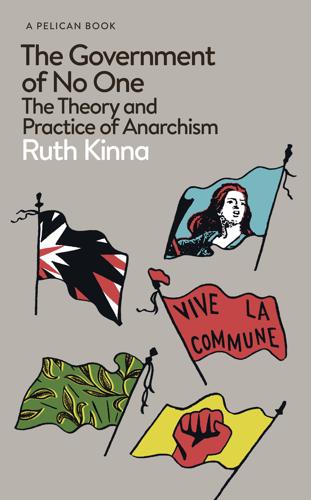
The Government of No One: The Theory and Practice of Anarchism
by
Ruth Kinna
Published 31 Jul 2019
Herman and Noam Chomsky, Manufacturing Consent (New York: Pantheon Books, 1988). 71 Rebecca Solnit, ‘Worlds Collide in a Luxury Suite: Some Thoughts on the IMF, Global Injustice, and a Stranger on a Train’, Huffington Post, 22 May 2011, updated 22 July 2011, online at https://www.huffingtonpost.com/rebecca-solnit/worlds-collide-in-a-luxur_b_865307.html [last access 27 November 2011]. 72 Rebecca Solnit, ‘Democracy Should Be Exercised Regularly, On Foot’, Guardian, 6 July 2006, online at https://www.theguardian.com/commentisfree/2006/jul/06/comment.politics [last access 27 November 2011]. 73 Murray Bookchin, ‘Listen, Marxist!’, in Post-Scarcity Anarchism (Edinburgh and Oakland: AK Press, 2004 [1970]), p. 135 [108–43]. 74 Murray Bookchin, ‘What is Social Ecology?’, in Social Ecology and Communalism (Edinburgh and Oakland: AK Press, 2007), p. 45 [19–52]. 75 Murray Bookchin, The Next Revolution: Popular Assemblies and the Promise of Direct Democracy (London: Verso, 2015), p. 71. 76 Bookchin, The Next Revolution, p. 70. 77 Murray Bookchin, Preface to Urbanization Without Cities: The Rise and Decline of Citizenship (Montreal: Black Rose, 1992), p. x. 78 Guy-Ernest Debord, The Society of the Spectacle, ch. 7: ‘The Organization of Territory’, para. 174, online at http://library.nothingness.org/articles/SI/en/display/24 [last access 4 June 2018]. 79 Bookchin, Urbanization Without Cities, p. 3. 80 Bookchin, Preface to Urbanization Without Cities, p. x. 81 Bookchin, The Next Revolution, p. 66. 82 Bookchin, ‘Radical Politics’, in Social Ecology and Communalism, p. 66. 83 Bookchin, The Limits of the City (New York: Harper Torchbooks, 1974), p. 137. 84 Bookchin, ‘Radical Politics’, p. 61. 85 Bookchin, The Next Revolution, p. 87. 86 David Graeber, ‘Enacting the Impossible (On Consensus Decision Making)’, Occupy Wall Street, 29 October 2011, online at http://occupywallst.org/article/enacting-the-impossible/ [last access 2 December 2017]. 87 Murray Bookchin, ‘What is Communalism?
…
This tradition ran ‘from Bakunin to Kropotkin to Sophie Perovskaya to Emma Goldman to Errico Malatesta to Murray Bookchin’. It was ‘less familiar to most radicals because it has consistently been distorted and misrepresented by the more highly organized State organization and Marxist-Leninist organization’.4 Anarchism still routinely gets a bad press, but fifty years on, radicals can at least tap into the traditions that Levine and Leighton helped uncover. In this context, Abdullah Öcalan, leader of the Kurdish Workers’ Party, has raised anarchism’s star to new heights. His adaptation of Murray Bookchin’s democratic communalism has been central to the constitutional project that has been initiated by Kurdish forces active in Northern Syria.
…
., ‘Your Politics Are Boring As Fuck’, Days of War, Nights of Love (CrimethInc. 11 August 2000), online at https://crimethinc.com/2000/09/11/your-politics-are-boring-as-fuck [last access 5 July 2017]. 49 Robert Wringham, ‘An Invitation to New Escapology’, New Escapologist or: Goodbye to All That, 1 (2008), p. 12. 50 Cindy Milstein, Anarchism and Its Aspirations (Edinburgh and Oakland: AK Press/Institute for Anarchist Studies, 2010), p. 56. 51 Murray Bookchin, Social Anarchism or Lifestyle Anarchism: An Unbridgeable Chasm (Edinburgh and Oakland: AK Press, 1995), p. 16. 52 Murray Bookchin, ‘The Left that Was’, in Social Anarchism or Lifestyle Anarchism, p. 66. 53 Bookchin, Social Anarchism or Lifestyle Anarchism, p. 59. 54 Matthew Wilson, Biting the Hand that Feeds Us: In Defence of Lifestyle Politics, Dysophia open letter #2 (Leeds: Dysophia, n.d.), p. 4. 55 Takurō Higuchi, ‘Global Anarchism and the Will of the Earth – Implications of Eastern Resonances’, in Kikaru Tanaka, Masaya Hiyazaki and Chihaur Yamanaka (eds), Global Anarchism: Past, Present and Future – New Anarchism in Japan (Tokyo: Association for Anarchism Studies/Kansai, 2014), p. 140. 56 Wilson, Biting the Hand that Feeds Us, p. 5. 57 Marianne Maeckelbergh, ‘Horizontal Decision-Making across Time and Place’, Cultural Anthropology, 27 July 2012, online at https://culanth.org/fieldsights/64-horizontal-decision-making-across-time-and-place [16 June 2017]. 58 Alix Kates Shulman, ‘Dances with Feminists’ [1991], Emma Goldman Papers, online at http://www.lib.berkeley.edu/goldman/Features/danceswithfeminists.html [24 June 2017]. 59 Kirwin R.
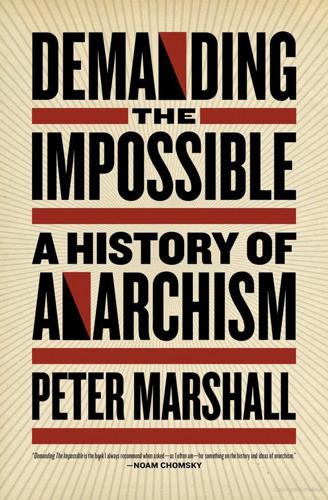
Demanding the Impossible: A History of Anarchism
by
Peter Marshall
Published 2 Jan 1992
Social Ecology One of the most influential expressions of anarchism has come in the growing Green movement, which has attracted not only libertarian socialists like Cohn-Bendit in Germany but avowed anarchist thinkers like Murray Bookchin in the United States. The new ‘social ecology’, which finds the roots of the ecological crisis in society and calls for an end to hierarchy and domination, has proved to be one of the most fruitful developments in contemporary anarchism. Whereas nineteenth-century anarchists like Kropotkin still saw the need for the ‘conquest of nature’ and industrial progress in order to eradicate poverty, social ecologists argue that in our post-industrial and post-scarcity society the principal concern must be to overcome the drive to conquer and master nature. As Murray Bookchin has argued, the very idea of dominating nature probably first evolved from man’s prior domination of woman.
…
Thousands of people influenced by Goodman in the counter-culture in the sixties and seventies tried to do just that by creating alternative ways of living and seeing in communes and collectives. The ‘Flower Power’ generation, whom Goodman inspired and admired, attempted to put into practice the kind of pacifist anarchism to which he devoted his life. 39 Murray Bookchin and the Ecology of Freedom ONE OF THE MOST influential thinkers to have renewed anarchist thought and action since the Second World War is undoubtedly Murray Bookchin. His main achievement is to have combined traditional anarchist insights with modern ecological thinking to form what he calls ‘social ecology’. In this way, he has helped develop the powerful libertarian tendency in the contemporary Green movement.
…
, Towards an Anarchist Theory of Race (Detroit, n.d.) 48 Ursula K. Le Guin, The Dispossessed (New York: Harper & Row, 1974), p. 241 49 See Murray Bookchin, Re-enchanting Humanity: A Defense of the Human Spirit against Anti-Humanism, Misanthropy, Mysticism and Primitivism (Cassell, 1995) 50 Bookchin, Social Anarchism or Life-Style Anarchism: An Unbridgeable Chasm op. cit., p. 1 51 Ibid., p. 56 52 Ibid., p. 9 53 Bookchin, ‘Libertarian Muncipalism: An Overview’, Society and Nature, 1, 1 (1992), p. 94. See also Janet Biehl and Murray Bookchin, The Politics of Social Ecology: Libertarian Municipalism (Montréal: Black Rose, 1997) 54 Bookchin, Interview with David Vanek, Harbinger: A Journal of Social Ecology, 2, 1 (Spring, 2003), p. 2 55 Bookchin, Introduction, third edition, Post-Scarcity Anarchism (Edinburgh: AK Press, 2004) 56 Brian Morris, Ecology and Anarchism: Essays and Reviews on Contemporary Thought (Malvern Wells: Images, 1996), p. 5.
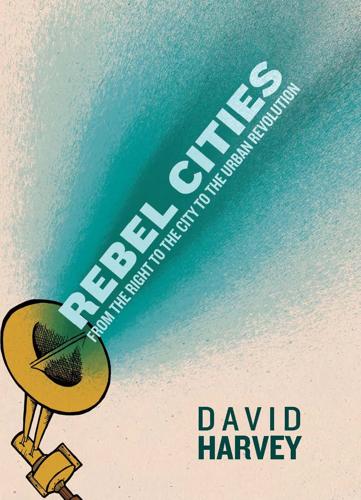
Rebel Cities: From the Right to the City to the Urban Revolution
by
David Harvey
Published 3 Apr 2012
Now, however, principles are frequently advanced-such as "horizontality " and "non-hierarchy "-or visions of radical democracy and the governance of the commons, that can work for small groups but are impossible to operationalize at the scale of a met ropolitan region, let alone for the 7 billion people who now inhabit planet earth. Programmatic priorities are dogmatically articulated, such as the abolition of the state, as if no alternative form of territorial governance would ever be necessary or valuable. Even the venerable social anarchist and anti-statist Murray Bookchin, with his theory of confederalism, vigorously advocates the need for some territorial governance, without which the Zapatistas, just to take one recent example, would also cer tainly have met with death and defeat: though often falsely represented as being totally non-hierachical and "horizontalist" in their organizational structure, the Zapatistas do make decisions through democratically selected delegates and officers.10 Other groups focus their efforts on the recuperation of ancient and indigenous notions of the rights of nature, or insist that issues of gender, racism, anti-colonialism, or indigeneity must be prioritized above, if not preclude, the pursuit of an anti-capitalist politics.
…
To top it all, there is a conspicuous absence of broadly agreed concrete proposals as to how to reorganize divisions of labor and (monetized?) economic transactions throughout the world to sustain a reasonable standard of living for all. Indeed, this problem is all too often cavalierly evaded. As a leading anarchist thinker, David Graeber, puts it, echoing the reservations of Murray Bookchin set out above: Temporary bubbles of autonomy must gradually turn into permanent, free com munities. However, in order to do so, those communities cannot exist in total isolation; neither can they have a purely confrontational rela tion with everyone around them. They have to have some way to engage with larger economic, social or political systems that surround them.
…
Thus, Massimo de Angelis, The Beginning of History: Value Struggles and Glo bal Capital, London: Pluto Press, 2007: 1 34, writes that "Hardin has engineered a justi fication for privatization of the commons space rooted in an alleged natural necessity:' 3. Elinor Ostrom, Governing the Commo ns: The Evolu tio n of Institutions for Collective Action, Cambridge: CUP, 1 990. 4. Eric Sheppard and Robert McMaster, eds, Scale and Geographic Inqu iry, Oxford: Blackwell, 2004. 5. One anarchist theorist who does take this problem seriously is Murray Bookchin, in Remaking Society: Path ways to a Green Fu ture, Boston, MA: South End Press, 1 990; and Urban ization witho ut Cities: The Rise and Decline of Citizensh ip, Montreal: Black Rose Books, 1 992. Marina Sitrin, Horizontalism: Voices of Popular Power in A rgentina, Oakland, CA: AK Press, 2006, provides a stirring defense of anti-hierarchical thinki ng.
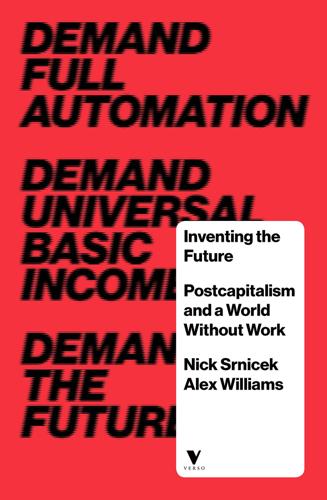
Inventing the Future: Postcapitalism and a World Without Work
by
Nick Srnicek
and
Alex Williams
Published 1 Oct 2015
Private Sector Myths (London: Anthem, 2013); Michael Hanlon, ‘The Golden Quarter’, Aeon Magazine, 3 December 2014, at aeon.co. 83.For a detailed account of this, see Mazzucato, Entrepreneurial State, Chapter 5. 84.Mariana Mazzucato, Building the Entrepreneurial State: A New Framework for Envisioning and Evaluating a Mission-Oriented Public Sector, Working Paper No. 824, Levy Economics Institute of Bard College, 2015, pdf available at levyinstitute.org, p. 9; Carlota Perez, Technological Revolutions and Financial Capital: The Dynamics of Bubbles and Golden Ages (Cheltenham: Edward Elgar, 2003). 85.Mazzucato, Building the Entrepreneurial State, p. 2. 86.For more, see missionorientedfinance.com. 87.Caetano Penna and Mariana Mazzucato, ‘Beyond Market Failures: The Role of State Investment Banks in the Economy’, paper presented at the Conference on Mission-Oriented Finance for Innovation, London, 24 July 2014, available on youtube.com. 88.Germany’s major transformation towards renewable energy provides perhaps the best current example of this. 89.Nick Dyer-Witheford, ‘Cycles and Circuits of Struggle in High-Technology Capitalism’, in Jim Davis, Thomas Hirschl and Michael Stack, eds, Cutting Edge: Technology, Information, Capitalism and Social Revolution (London: Verso, 1997), pp. 206–7; Adrian Smith, Socially Useful Production, STEPS Working Paper 58 (Brighton STEPS Centre, 2014), at steps-centre.org, p. 2. 90.This shares some properties with Murray Bookchin’s notion of liberatory technologies, though we are obviously less inclined towards his vision of a small-scale communitarian future. Murray Bookchin, ‘Towards a Liberatory Technology’, in Post-Scarcity Anarchism (Edinburgh: AK Press, 2004). 91.Hilary Wainwright and Dave Elliott, The Lucas Plan: A New Trade Unionism in the Making? (London: Allison & Busby, 1981), p. 16. 92.Ibid., pp. 10, 89. 93.Ibid., pp. 101–7. 94.Smith, Socially Useful Production, p. 5. 95.Ibid., p. 1. 96.Ibid., p. 2. 97.Wainwright and Elliott, Lucas Plan, p. 231. 98.Ibid., p. 157. 99.Tiqqun, The Cybernetic Hypothesis, n.d., at theanarchistlibrary.org. 100.Eden Medina, Cybernetic Revolutionaries: Technology and Politics in Allende’s Chile (London: MIT Press, 2011), p. 26. 101.Ibid., p. 64. 102.Ibid., p. 72. 103.Ibid., p. 146. 104.Ibid., p. 150. 105.Ibid., p. 79. 106.Jameson, Valences of the Dialectic; Toscano, ‘Logistics and Opposition’; Mike Davis, ‘Who Will Build the Ark?’
…
Anti-Authoritarian Politics from Practice to Theory (London: Pluto, 2007), p. 20. 8.While we remain unconvinced of the large-scale prospects for direct democracy in its face-to-face and/or consensus-driven forms, this certainly does not preclude thinking about how participative democracy might be conceived along more complex, technologically mediated lines. 9.Murray Bookchin, Post-Scarcity Anarchism (Edinburgh: AK Press, 2004), p. xxviii. 10.Ibid., p. 58. 11.Manuel Castells, Networks of Outrage and Hope: Social Movements in the Internet Age (Cambridge, UK/Malden, MA: Polity, 2012), p. 11. 12.The origin of the form of consensus decision-making used in contemporary left activism is generally thought to have been with the Quaker religious movement around 300 years ago.
…
., The Guaranteed Income: Next Step in Economic Evolution? (Garden City, NY: Doubleday, 1966); Martin Luther King, Where Do We Go from Here? Chaos or Community? (Boston, MA: Beacon, 2010); Milton Friedman, Capitalism and Freedom: Fortieth Anniversary Edition (Chicago: University of Chicago Press, 2002); Murray Bookchin, Post-Scarcity Anarchism (Edinburgh: AK Press, 2004); Michael Hardt and Antonio Negri, Empire (Cambridge, MA: Harvard University Press, 2001); Weeks, Problem with Work. 93.Walter Van Trier, ‘Who Framed “Social Dividend”?’, presented at the First USBIG Conference, CUNY, New York, 8 March 2002, at econpapers.repec.org, p. 29. 94.Lynn Chancer, ‘Benefitting from Pragmatic Vision, Part I: The Case for Guaranteed Income in Principle’, in Aronowitz and Cutler, Post-Work, p. 86. 95.Evelyn Forget, The Town with No Poverty: Using Health Administration Data to Revisit Outcomes of a Canadian Guaranteed Annual Income Field Experiment (Winnipeg: University of Manitoba, 2011); Derek Hum and Wayne Simpson, ‘A Guaranteed Annual Income?
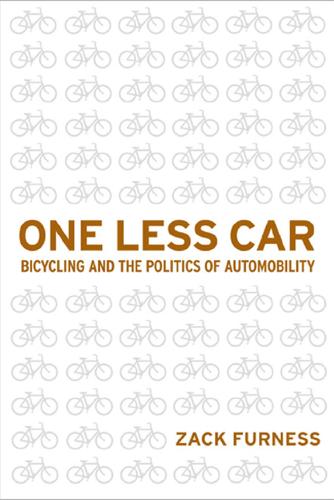
One Less Car: Bicycling and the Politics of Automobility
by
Zack Furness
and
Zachary Mooradian Furness
Published 28 Mar 2010
For the cyclist, these myriad aspects of the city are immediate and tactile, not concealed behind steel and glass.63 Bicycling, in the simplest terms, transforms “out there” to “right here.” But there is a much deeper sense in which this physical/technological shift becomes meaningful as a restorative act—a small way to subvert the fractioning of everyday life that andré Gorz and Murray Bookchin, for example, see manifested in capitalism and reproduced/reified through the daily practice of driving.64 it does not always foster a more authentic or real engagement with the city, as Williams and so many other bicyclists (and car critics) would have it, but it necessarily “forces a different kind of interaction with the world.”65 louis Mendoza, who undertook a cross-country bicycle trip to research immigration and the “latinoization” of the United States, suggests that this mode of interaction is “not always better . . . but that may well be the point.”66 indeed, one of the reasons why bike riders are so passionate about bicycling, and by extension so excited about the idea of a bike culture in development, is because traveling outside of the cage—a term that motorcycle riders and some Massers use for the car—is seen as a point of entrée to a less mediated experience of the world that is precisely not predetermined or mundane.67 Bicycling, in this sense, is quite literally a way of exposing oneself to “the social,” and of embracing what Jen petersen calls the “dialectical relationship with urbanity.”68 That is to say, riding a bike can cultivate a keen awareness of not only one’s right to the city but also one’s right to be produced by the city.
…
Jeff Ferrell speaks to the latter aspect of this intervention: putting ourselves and our bicycles on the line, confronting automotive dominance through direct action, we invent the impossible: an island of safety, calm, and conversation in the middle of a busy street. and, in fine reflexive fashion, we inhabit this island with talk of Critical Mass rides in other cities, strategies for surviving encounters with motorists, sabotage in the workplace, anarchist history, and other subversions.70 at their best, such moments are likened to a temporary autonomous zone (TaZ), which Hakim Bey (aka peter lamborn Wilson) defines as “an uprising which does not engage directly with the State: a guerilla operation which liberates an area (of land, of time, of imagination) and then dissolves itself to re-form elsewhere/elsewhere, before the State can crush it.”71 Within this literal or metaphorical domain, the typical norms governing a material or social space are reworked for a brief moment in time, in the same way Mikhail Bakhtin envisioned the “free and familiar contact” of the carnival.72 One of the obvious problems posed by a political reading of the TaZ is that temporary moments of resistance do not do anything politically, as it were, much less provide a sustainable model for widespread mobilization. Murray Bookchin’s scathing denunciation of “lifestyle anarchism,” for example, takes issue with Hakim Bey’s paradigm for precisely this reason: like an andy Warhol “happening,” a TaZ is a passing event, a momentary orgasm, a fleeting expression of the “will to power” that is, in fact, conspicuously powerless in its capacity to leave any imprint on the individual’s personality, subjectivity, and even self-formation, still less on shaping events and reality. . . .
…
He writes, “The way our space is arranged carries on the disintegration of people that begins with the division of labour in the factory. it cuts a person into slices, it cuts our time, our life, into separate slices so that in each one you are a passive consumer at the mercy of the merchants, so that it never occurs to you that work, culture, communication, pleasure, satisfaction of needs, and personal life can and should be one and the same thing: a unified life, sustained by the social fabric of the community.” Murray Bookchin, whose work is also heavily influenced by Karl Marx, makes a similar point: “City planning is an expression of mistrust in the spontaneity of contemporary social relations, and for good reason. Bourgeois society divides virtually all spheres of life against each other; it universalizes competition, profit, and the primacy of exchange value over mutual aid, art, and utility.”
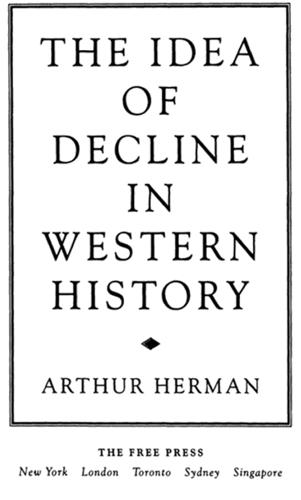
The Idea of Decline in Western History
by
Arthur Herman
Published 8 Jan 1997
Echoing an ancient Aryanist theme, Reich added that “the forest is where they come from, it is the place where they feel closest to themselves, it is renewal. Nature is not some foreign element. Nature is them.”37 However, the thinker who ultimately separated ecological pessimism from its blood-and-soil associations and turned it into a pillar of the New Left was Murray Bookchin. An admirer of the nineteenth-century anarchist tradition and a close student of earlier antitechnic critics such as Lewis Mumford and Paul Goodman, Bookchin embraced Marcuse’s idea that postscarcity society represented a profoundly new and dangerous development for civilization. In 1966 Bookchin published Crisis of the Cities, in which he predicted that America’s industrial cities were spreading “like a rampant cancer” into the hinterland, destroying wilderness, agricultural land, and waterways.
…
“The modern Western self,” Naess explained, “is defined as an isolated ego striving narrowly for hedonistic gratification or … individual salvation in this life or the next.” This false self-image “robs us of the beginning of our search for our unique spiritual/biological personhood” through oneness with nature.41 Murray Bookchin’s The Modern Crisis pointed to the challenge of bringing to heel modern man’s “market society and the vicious mentality it breeds.” Pollution, industrial degradation of the environment, acid rain, global warming, and nuclear militarism on a massive scale were all the egregious products of Western capitalism.
…
As Dave Foreman puts it, “I think that the role of an avant garde group is to throw out ideas that are objected to as absurd or ridiculous at first, but end up trickling into the mainstream and becoming more accepted over time.” This had been the case with the Gaia thesis, which radicals now frown on as being too human-friendly.76 This extremism has raised the ire of more pacific figures like Murray Bookchin, who has accused Earth First! of indulging in “eco-fascism.”77 On the other hand, the German Greens have condoned violence “against objects”—such as animal rights groups throwing paint on fur coats—as part of civil disobedience. In 1990 Earth First! activists tore down electricity towers in central California as part of their “monkey-wrenching” protest against Earth Day (the symbol of environmental humanism).
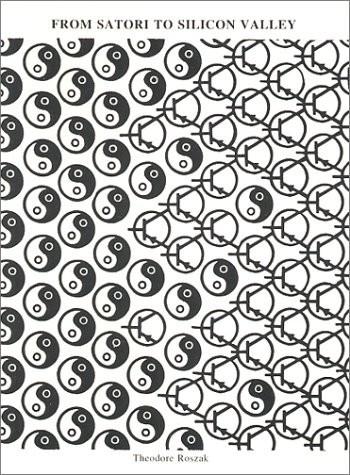
From Satori to Silicon Valley: San Francisco and the American Counterculture
by
Theodore Roszak
Published 31 Aug 1986
If the wishful paradigm that sparked discussion of issues like these was a somewhat romanticized neoprimitivism, that may be of less intellectual im- portance than the quality of the ideas that soon found currency within this unlikely public of dissenting and dropped-out middle class youth. For these in- cluded the human-scaled economics (sometimes quaintly called the "Buddhist economics") of E.F. Schumacher, the communitarian philosophy of Paul Goodman and Murray Bookchin, the feminist in- surgency of the women's movement, the convivial social theories of Ivan Illych, the ecological poetics 10 of Gary Snyder, human humanistic and so many the manifold insights of the potential psychologies. Like tributaries, these currents of thought at last flowed into the environmental movement of the early seventies, which survives as the most durable offshoot of countercultural protest.
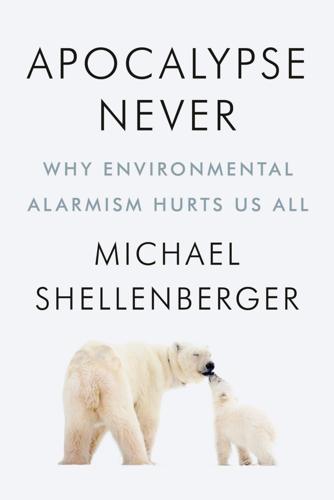
Apocalypse Never: Why Environmental Alarmism Hurts Us All
by
Michael Shellenberger
Published 28 Jun 2020
Alexis Madrigal, Powering the Dream: The History and Promise of Green Technology (Cambridge, MA: Da Capo Press, 2011), 124–125. 53. Ibid., 125. 54. Ibid., 87. 55. Ibid., 92–126. 56. Martin Heidegger, The Question Concerning Technology and Other Essays (New York & London: Garland Publishing Inc., 1954), 14. 57. Murray Bookchin, The Murray Bookchin Reader (Montreal: Black Rose Books, 1999), 18–19, 91. 58. Barry Commoner, Making Peace with the Planet (New York: New Press, 1992), 193. 59. Barry Commoner, Crossroads: Environmental Priorities for the Future (Washington, DC: Island Press, 1988), 146. 60. Ibid., 182. 61. Amory B.
…
The key to ending humankind’s alienation from nature, the influential German philosopher Martin Heidegger argued in 1954, was for societies to use unreliable, not reliable, renewables. He condemned hydroelectric dams, which created large reservoirs of water that allowed for energy to be created whenever humans needed it. By contrast, he praised windmills.56 In 1962, American socialist writer Murray Bookchin denounced cities for spreading over the countryside like a rampant “cancer” and praised renewables as an opportunity for bringing land and city into a “synthesis of man and nature.” Bookchin recognized that his proposal “conjures up an image of cultural isolation and social stagnation, of a journey backward in history to the agrarian societies of the medieval and ancient worlds.”
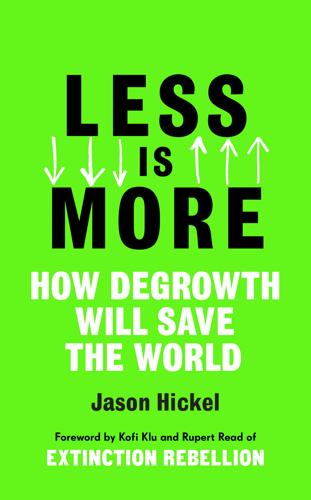
Less Is More: How Degrowth Will Save the World
by
Jason Hickel
Published 12 Aug 2020
Asked to explain this odd name, Verily’s CEO Andy Conrad said it had been chosen because ‘only through the truth are we going to defeat Mother Nature’. Two Rise of the Juggernaut Capitalism can no more be ‘persuaded’ to limit growth than a human being can be ‘persuaded’ to stop breathing. Murray Bookchin I still remember when I first learned about the history of capitalism in school. It was a happy story that started with the invention of the steam engine in the eighteenth century and worked its way through a parade of technological innovations, from the flying shuttle all the way up to the personal computer.
…
I’ve also learned from and been inspired by the writings of many others: Silvia Federici, Jason Moore, Andreas Malm, Naomi Klein, Kevin Anderson, Tim Jackson, Juliet Schor, Vandana Shiva, Arturo Escobar, George Monbiot, Herman Daly, Kate Aronoff, Robert Macfarlane, Abdullah Öcalan, Ariel Salleh, David Wallace-Wells, Nnimmo Bassey, Robin Wall Kimmerer, Timothy Morton, Daniel Quinn, Carolyn Merchant, Vijay Prashad, David Harvey, Maria Mies, Gustavo Esteva, André Gorz, Serge Latouche, Bill McKibben, Jack D. Forbes, Philippe Descola, David Abrams, Kofi Klu, Bruno Latour, Suzanne Simard, Murray Bookchin, and Ursula Le Guin. Their works have been signposts along the way. But this list only barely scratches the surface. And I cannot leave out the towering figures whose words – and lives – I find myself returning to over and over again, for grounding and direction: Aimé Césaire, Frantz Fanon, Thomas Sankara, Berta Cáceres, Mahatma Gandhi, Patrice Lumumba, Samir Amin.
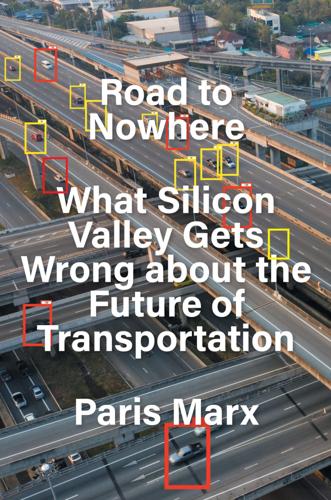
Road to Nowhere: What Silicon Valley Gets Wrong About the Future of Transportation
by
Paris Marx
Published 4 Jul 2022
Instead of arguing for simple technological fixes such as speed limiters in every automobile, which Europe has made mandatory for all new vehicles in 2022, or vastly improving public transit to get more people out of cars, their solutions are not just to keep people in cars, but to encourage more automobile use with a range of increasingly ridiculous proposals that avoid the fact that mass automobility and the desire for vehicles to move as fast as possible are central parts of the problem. While this is frustrating, and far from helpful, it is not surprising. In 1978, then-anarchist Murray Bookchin gave a speech where he described the language of futurism and of electronics as “the language of manipulation.”13 Bookchin argued that these powerful figures dreaming up big ideas for the future of humanity did not think critically about how society had arrived at its contemporary point and whether the social relations of the time were working for most people.
…
Le Guin, “The Carrier Bag Theory of Fiction,” in Dancing at the Edge of the World, Grove Press, 1986, Theanarchist library.com. 9 Ibid. 10 Ursula K. Le Guin, “A Rant about ‘Technology’,” Ursula K. Le Guin (blog), 2004, Ursulakleguinarchive.com. 11 Ibid. 12 Mimi Sheller, Mobility Justice: The Politics of Movement in an Age of Extremes, Verso Books, 2018, p. 46. 13 Murray Bookchin, “Utopia, Not Futurism: Why Doing the Impossible Is the Most Rational Thing We Can Do,” lecture at Toward Tomorrow Fair in Amherst, Massachusetts, trans. Constanze Huther, October 2, 2019 [August 24, 1978], Unevenearth.org. 14 Ibid. 15 Ibid. 16 Ben Fried, “How Paris Is Beating Traffic without Congestion Pricing,” Streetsblog USA, April 22, 2008, Usa.streetsblog.org. 17 Laura Bliss, “Los Angeles Passed a Historic Transit Tax.
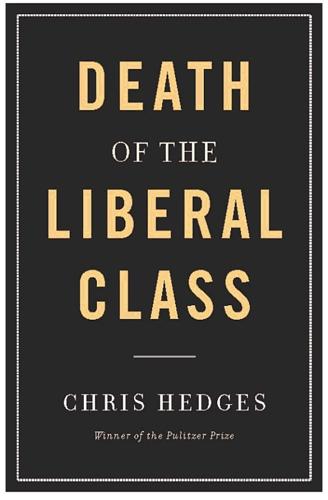
Death of the Liberal Class
by
Chris Hedges
Published 14 May 2010
The moral vacuum of the counterculture disturbed religious radicals, such as Father Daniel Berrigan and his brother Philip, the Catholic Worker leader Dorothy Day, and the Reverend William Sloane Coffin, as well as stalwarts from the decimated Communist Party and old anarchists such as Dwight Macdonald and Murray Bookchin. The transition from street protester to grant applicant was, as Bookchin noted sourly, not hard, given the moral vacuum in the New Left. “Radical politics in our time has come to mean the numbing quietude of the polling booth, the deadening platitudes of petition campaigns, carbumper sloganeering, the contradictory rhetoric of manipulative politicians, the spectator sports of public rallies and finally, the knee-bent, humble plea for small reforms,” Bookchin wrote:in short, the mere shadows of the direct action, embattled commitment, insurgent conflicts, and social idealism that marked every revolutionary project in history. . . .
…
“On the Air,” New American Review 10 (August 1970), 20. 2 Peter B. Levy, The New Left and Labor in the 1960s (Urbana, IL: University of Illinois Press, 1994), 47-48. 3 Sharon Smith, Subterranean Fire: A History of Working-Class Radicalism in the United States (Chicago: Haymarket Books, 2006), 216-217. 4 Murray Bookchin, Towards an Ecological Society (Montreal: Black Rose Books, 1980), 11-12. 5 Irving Howe, “The Age of Conformity,” 151. 6 Ibid., 152. 7 Neal Gabler, Life: The Movie: How Entertainment Conquered Reality (New York: Vintage, 1988), 132. 8 Ibid., 135. 9 Eva Cockroft, “Abstract Expressionism, Weapon of the Cold War,” in Francis Frascina, ed., Pollock and After: The Critical Debate (New York: Harper & Row, 1985), 132. 10 Carol Becker, Zones of Contention: Essays on Art, Institutions, Gender and Anxiety (Albany, NY: State University of New York Press, 1996), 9. 11 Alan Magee, interview, New York, March 30, 2010. 12 Rob Shetterly, interview, New York, July 11, 2010. 13 Ben Fulton, “Calling on artists to lead the way; Fine arts: Columbia University dean Carol Becker to speak at U,” Salt Lake Tribune, March 27, 2010. 14 C.
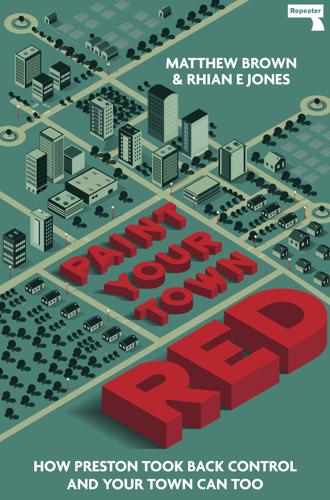
Paint Your Town Red
by
Matthew Brown
Published 14 Jun 2021
Still others have shown the capacity for grassroots movements to influence national policy, like the citizens’ assembly in Ireland which initiated the national referendum that overturned the country’s longstanding ban on access to abortion. Much has been written on the theoretical foundations of democratic localism, from Peter Kropotkin’s 1902 Mutual Aid: A Factor of Evolution to Murray Bookchin, whose ideas were taken up in the democratic federalism of Rojava. The recent achievements of collectivist movements rooted in neighbourhoods and communities all over the world demonstrate that community wealth-building and local decision-making are not just a theory, but a proven practical strategy which shows how alternative ways of living and working can be developed through a variety of approaches.
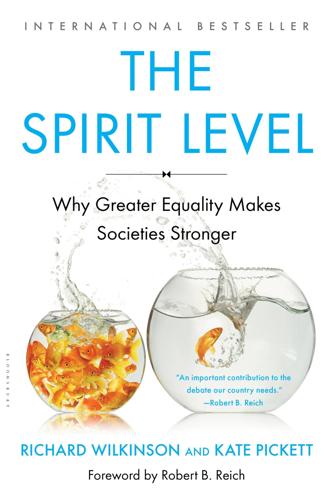
The Spirit Level: Why Greater Equality Makes Societies Stronger
by
Richard Wilkinson
and
Kate Pickett
Published 1 Jan 2009
As many countries have adopted smaller, more fuel-efficient cars, national emissions have usually continued to rise despite the increased efficiency. A STEADY-STATE ECONOMY It is clear that we have to move to something more like the steady-state economy first proposed by economist Herman Daly.347 But how do we do that when, as Murray Bookchin, the American social ecologist and libertarian philosopher, said, ‘Capitalism can no more be “persuaded” to limit growth than a human being can be “persuaded” to stop breathing’?348 When Daly developed the concept of a steady-state economy people were more concerned about using up the earth’s finite mineral and agricultural resources than they were with global warming.
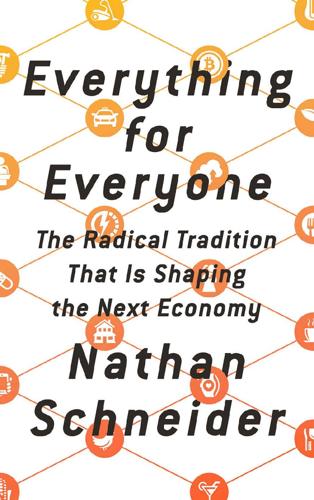
Everything for Everyone: The Radical Tradition That Is Shaping the Next Economy
by
Nathan Schneider
Published 10 Sep 2018
(This was a troubling arrangement for Turkey, whose rulers have spent decades suppressing Kurdish insurgencies inside their borders.) The Kurds, at last out of Damascus’s reach, declared their new regime in 2012, among the ruins left from the ISIS occupation and subsequent liberation. They professed a doctrine of “democratic confederalism,” derived from the ideas of US philosopher Murray Bookchin, as synthesized by Kurdish leader Abdullah Öcalan from his jail cell in Turkey. It’s a system meant to render the nation-state obsolete through overlapping networks of local “communes.” Gender equality, environmentalism, and ethnic pluralism are celebrated, and the police—while perhaps necessary for a time as the war goes on—are designed for eventual abolition.
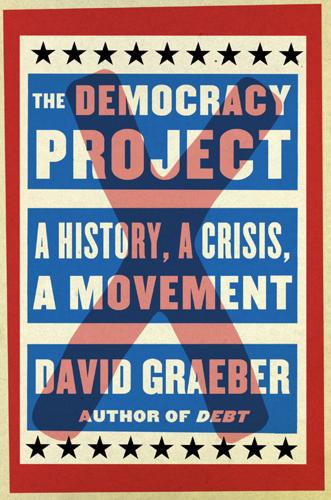
The Democracy Project: A History, a Crisis, a Movement
by
David Graeber
Published 13 Aug 2012
I should note here that the first mass use of consensus process, in the antinuclear movement of the late 1970s and early 1980s, was often quite rocky—partly out of simple lack of experience, partly out of purism (it was only later that modified consensus for larger groups came into common use)—and many who went through the experience, most famously libertarian socialist Murray Bookchin, who promoted the idea of communalism, came out strongly against consensus and for majority rule. b One does sometimes worry that the Gouverneur Morrises of the world have ultimately been successful in preventing such knowledge from reaching most of the population. c It wouldn’t have to be based on a system of strict consensus, by the way, since, as we’ll see, absolute consensus is unrealistic in large groups—let alone on a planetary scale!
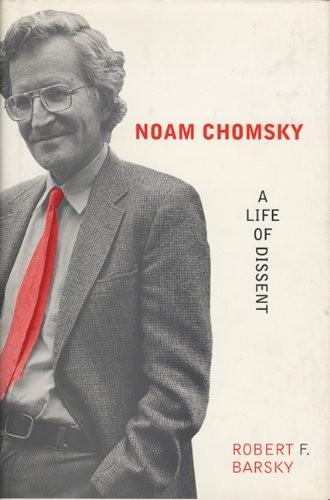
Noam Chomsky: A Life of Dissent
by
Robert F. Barsky
Published 2 Feb 1997
The values, the intellectual rigor, and the concern for emancipatory movements that pervade the many works of both men testify to their tenacity and integrity as intellectuals and individuals. They inspired one another. Russell Jacoby does not mention Harris in his work The Last Intellectuals: American Culture in the Age of Academe, but what he says about Chomsky, Murray Bookchin, Paul Goodman, and Isaac Rosenfeld could be applied equally to Harris: "to the extent that they are anarchists, they distrust large institutions, the state, the university, and its functionaries. They are less vulnerable to the corruptions of title and salary because their resistance is moral, almost instinctual."
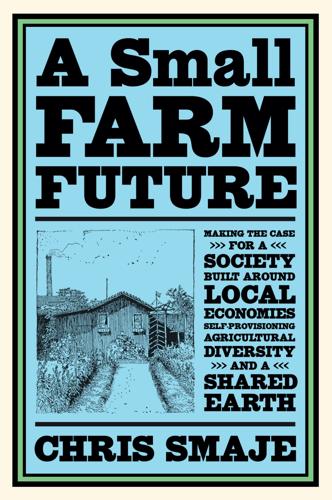
A Small Farm Future: Making the Case for a Society Built Around Local Economies, Self-Provisioning, Agricultural Diversity and a Shared Earth
by
Chris Smaje
Published 14 Aug 2020
Well, consider an alternative like usufruct, which is sometimes advocated in alternative economics circles. The idea is that nobody ‘owns’ the land, but that individuals can have the right to its ‘fruit’. In other words, you can farm the land and make your living from its produce. Usufruct is, in Murray Bookchin’s words: ‘the freedom of individuals in a community to appropriate resources merely by virtue of the fact they are using them. Such resources belong to the user as long as they are being used. Function, in effect, replaces our hallowed concept of possession.’24 The problem lies with the ‘as long as they are being used’ because it leaves unclear who gets to decide what counts as appropriate use.
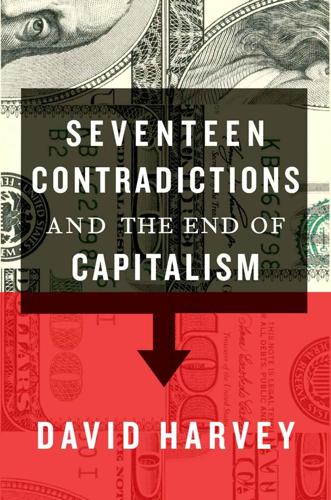
Seventeen Contradictions and the End of Capitalism
by
David Harvey
Published 3 Apr 2014
Arne Naess, Ecology, Community and Lifestyle, Cambridge, Cambridge University Press, 1989; William Leiss, The Domination of Nature, Boston, MA, Beacon Press, 1974; Martin Jay, The Dialectical Imagination: A History of the Frankfurt School and the Institute of Social Research, 1923–50, Boston, MA, Beacon Press, 1973; Murray Bookchin, The Philosophy of Social Ecology: Essays on Dialectical Naturalism, Montreal, Black Rose Books, 1990; Richard Peet, Paul Robbins and Michael Watts, Global Political Ecology, New York, Routledge, 2011; John Bellamy Foster, Marx’s Ecology: Materialism and Nature, New York, Monthly Review Press, 2000.
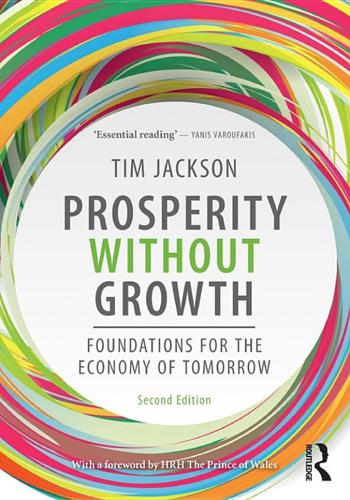
Prosperity Without Growth: Foundations for the Economy of Tomorrow
by
Tim Jackson
Published 8 Dec 2016
There is clearly a paradox here. If participation is really what matters, and material goods provide a language to facilitate that, then richer societies ought to show more evidence of it. But the very opposite appears to be the case, and has been for some time. Writing over 40 years ago, the ecologist Murray Bookchin suggested that modern society had already reached ‘a degree of anonymity, social atomization and spiritual alienation that is virtually unprecedented in human history’. And at the turn of this millennium, the sociologist Robert Putnam documented the extent of this collapse of community in his provocative book Bowling Alone.6 For years before the financial crisis, modern Western society was already in the grip of a social recession.
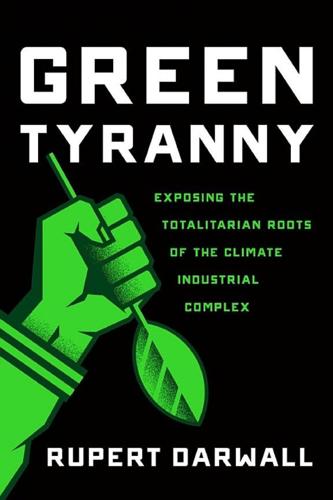
Green Tyranny: Exposing the Totalitarian Roots of the Climate Industrial Complex
by
Rupert Darwall
Published 2 Oct 2017
“Some day, political conservatism will once again be defined as contented living within limits,” he wrote in 1993.53 Thus environmentalism united enemies of capitalism and the Western ideal of freedom from otherwise mutually antagonistic ideologies. Anarchists were other foes of capitalism who founded environmentalism. The aim of the anarchist movement, Murray Bookchin wrote in an extraordinarily prophetic 1964 essay, was a stateless, decentralized society based on communal ownership of the means of production. Burning fossil fuels showed modern man’s disruptive role. The amount of carbon dioxide had increased by thirteen percent since the Industrial Revolution.
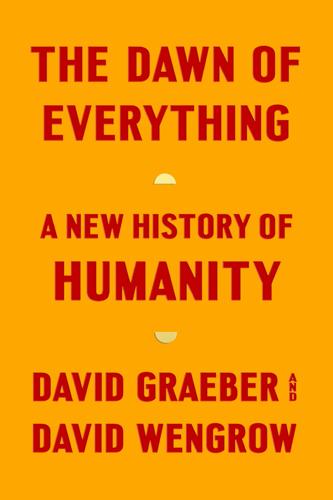
The Dawn of Everything: A New History of Humanity
by
David Graeber
and
David Wengrow
Published 18 Oct 2021
To better understand the reasons why this failure occurred, we will then consider some more successful expansions of early farming populations in Africa, Oceania and the tropical lowlands of South America. Historically speaking, there is no direct connection among these cases; but what they show, collectively, is how the fate of early farming societies often hinged less on ‘ecological imperialism’ than on what we might call – to adapt a phrase from the pioneer of social ecology, Murray Bookchin – an ‘ecology of freedom’.17 By this we mean something quite specific. If peasants are people ‘existentially involved in cultivation’,18 then the ecology of freedom (‘play farming’, in short) is precisely the opposite condition. The ecology of freedom describes the proclivity of human societies to move (freely) in and out of farming; to farm without fully becoming farmers; raise crops and animals without surrendering too much of one’s existence to the logistical rigours of agriculture; and retain a food web sufficiently broad as to prevent cultivation from becoming a matter of life and death.